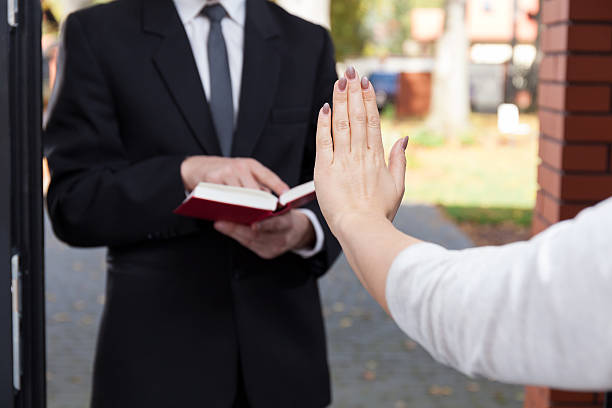
Jehovah's witness wants to evangelize and refusing woman
In the early morning of Feb. 15, 2019, armed police and intelligence agents burst into Timofey Zhukov’s home in Surgut, an oil town in western Siberia. They knocked him to the floor, then began searching his belongings, he said.
It was one of at least 20 raids across Surgut that day, Zhukov told Reuters. He said all of those targeted were Jehovah’s Witnesses, an organisation that had been banned in Russia two years earlier after Russia’s Supreme Court ruled it extremist. Russian authorities argued the organisation promotes its beliefs as superior to other faiths.
Zhukov and his fellow believers were detained for questioning and accused of “continuing the activities of an extremist organisation,” a crime that could lead to imprisonment. Russian authorities didn’t respond to questions from Reuters about the matter.
Zhukov, who trained as a lawyer, told Reuters he and the others have done nothing unlawful. The Surgut branch of the Jehovah’s Witnesses was liquidated after the ban came into force, Zhukov said, “but we continue to believe, regardless of whether there is a legal entity.”
Jarrod Lopes, a spokesperson for Jehovah’s Witnesses, told Reuters, “If Russia’s skewed view of extremism was imposed on everyone, then just about every believer and non-believer would be banned in Russia, not just Jehovah’s Witnesses.”
Jehovah’s Witnesses say they are politically neutral. They don’t lobby or vote for political candidates or run for office. They don’t sing national anthems or salute the flag of any nation because they view it as an act of worship. They also reject military service – a choice that has led to the imprisonment of Jehovah’s Witnesses members in several countries.
Religious life in Russia is dominated by the Orthodox Church, which is championed by President Vladimir Putin. Some Orthodox scholars view Jehovah’s Witnesses as a “totalitarian sect.”
Zhukov’s case is still working its way through the courts. But his name already appears on the register of “terrorists and extremists” and he can’t travel outside the city without permission. He has only restricted access to his bank account. If he wants to withdraw more than 10,000 roubles ($120) in a single month he has to explain the reasons: “I need to pay for the apartment, for kindergarten, for school.”
Over the past three years, Zhukov said, police and investigators threatened him with jail and he was forcibly admitted to a hospital in Yekaterinburg, 1,000 km away, to undergo a psychiatric examination. He said he spent 14 days there alongside patients who included violent criminals. “I passed all the tests, some involving devices on my head.”
The list of “terrorists and extremists” has grown steadily. At the end of 2021, there were more than 12,200 individuals and groups on the register, up 13% from about a year earlier. Russia doesn’t publish the dates on which names are added, but Reuters compared the current list with previous versions saved on archive.org, which stores web pages.
Violent extremists such as neo-Nazi groups and Islamic State appear on the list. At least 400 local Jehovah’s Witnesses groups are currently designated as extremist or terrorist, according to a Reuters analysis of the Russian list.
In January, a 56-year-old female Jehovah’s Witness was sentenced to six years in a penal colony for extremism. The following month, a 64-year-old man was handed a six-year sentence on the same charge. Both had insisted their innocence. Zhukov too insists that his religious beliefs do not contravene any law.
“As a lawyer, I can very easily distinguish between a religious association and a legal entity,” he said. “I can’t explain why some lawyers and judges can’t see the difference. And what threat do we pose?”
“We preach, we tell people about the kingdom of God from the Bible.”




ラブドール 通販 購入後にダッチワイフを活用する方法ダッチワイフは情熱的なサポートを提供できますか?Lumi人形調査–LumiDolls.comは合理的なセックス人形についてのトップ10の伝説をレビューします
muñeca de amor https://es.sexdollsoff.com
Telegram中文下载 具有跨平台特性,可在手机、电脑和平板等设备上同步使用。